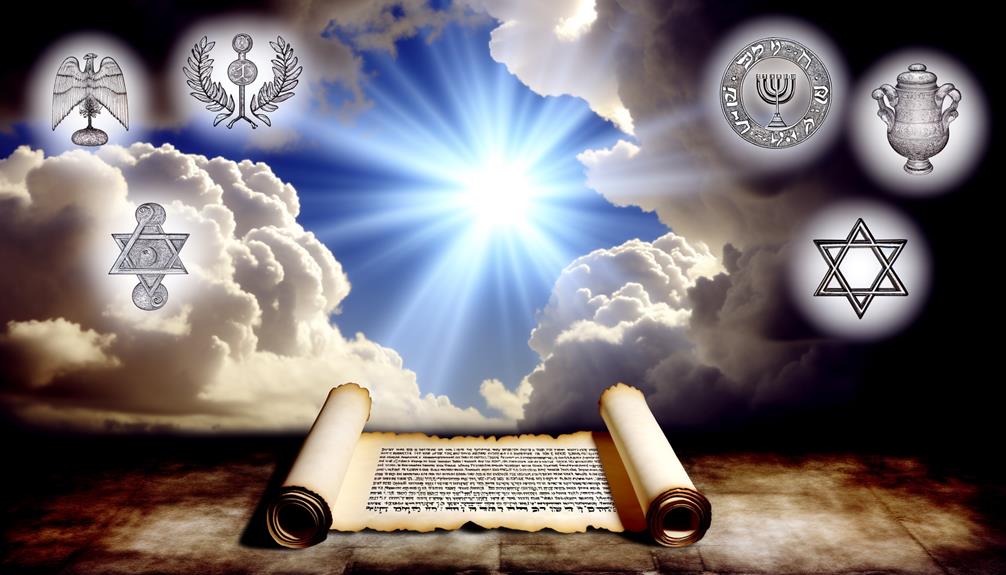Biblical Meaning of Name Isaiah
The name Isaiah originates from the Hebrew Yeshayahu, signifying 'Yahweh is salvation.' This theological proclamation is embodied in the prophetic ministry of Isaiah, a major biblical figure whose writings span warnings of judgment and promises of redemption. His prophecies, found in chapters such as Isaiah 7:14 and 53, have sculpted Messianic expectations within Judeo-Christian theology.
The book of Isaiah addresses the spiritual and moral decline of Israel and Judah, offering insights into God's justice and mercy. Isaiah's influence extends into contemporary spiritual discourse, where his messages continue to instill hope and divine assurance.
Explore further to understand his lasting impact.

Key Takeaways
- The name Isaiah means 'Yahweh is salvation,' originating from the Hebrew name Yeshayahu.
- Isaiah's name embodies a theological declaration of God's saving power.
- The prophet Isaiah's messages include themes of divine justice, mercy, and redemption.
- Isaiah's prophecies shape Messianic expectations in Judeo-Christian theology.
- The name reflects the divine salvation central to the Bible's prophetic literature.
Origin and Etymology
The name Isaiah, frequently encountered in theological studies, originates from the Hebrew name Yeshayahu, meaning 'Yahweh is salvation.' This profound etymology reflects the thematic essence of divine salvation inherent in biblical narratives. Similar to Isaiah, the biblical significance of the name Micah is also deeply rooted in the concept of salvation. In Hebrew, the name Micah means ‘who is like Yahweh,’ emphasizing the uniqueness and power of God’s salvation. Both Isaiah and Micah play important roles in conveying the message of hope and redemption in the Old Testament. Their names serve as a reminder of the eternal promise of deliverance found in the biblical narratives.
The name Isaiah is deeply rooted in ancient Hebrew culture, with its origins tracing back to the First Temple period. Linguistically, 'Yeshayahu' combines 'Yeshua' (salvation) and 'Yah' (an abbreviation of Yahweh), signifying the divine promise of deliverance.
In scriptural context, names carried significant theological messages, often encapsulating prophetic missions or divine attributes. Isaiah's name, by extension, not only identifies a historical figure but also embodies a theological declaration of God's saving power, resonating through the annals of Judeo-Christian traditions.
Isaiah in the Old Testament
Revered as a major prophet, Isaiah's presence in the Old Scripture is both profound and multifaceted, spanning themes of judgment, redemption, and eschatological hope. His ministry, rooted in the 8th century BCE, addressed the moral and spiritual decay of Israel and Judah. Isaiah's writings are a cornerstone of prophetic literature and are intricately woven into the historical and theological fabric of the Bible.
- Judgment and warning: Isaiah 1-39 highlights the dire consequences of Israel's disobedience.
- Vision of the Holy One: Isaiah 6 details his awe-inspiring call to prophecy.
- Hope and restoration: Chapters 40-55 offer comfort and future redemption.
- Messianic prophecies: Foretelling a coming savior (Isaiah 9:6-7).
- Eschatological visions: Depicting a new heaven and earth (Isaiah 65-66).
Isaiah's influence endures, offering timeless insights into divine justice and mercy.
Prophecies of Isaiah
The prophecies of Isaiah stand as a cornerstone for understanding both the Messianic expectations in Judeo-Christian theology and the socio-political landscape of ancient Israel.
Isaiah's foretellings, particularly those found in chapters 7, 9, and 53, provide profound insights into the coming of the Messiah, while concurrently addressing the historical realities of Assyrian and Babylonian threats.
These prophetic declarations not only offer hope but also serve as a divine commentary on the moral and spiritual state of the nation.
Major Messianic Prophecies
Among the numerous prophecies attributed to the prophet Isaiah, several have been profoundly influential in shaping the Messianic expectations within both Jewish and Christian traditions. Isaiah's prophecies offer a rich tapestry of theological insight and historical context, often seen as foretelling the coming of a savior.
Key Messianic prophecies include:
- Isaiah 7:14: The sign of Immanuel, interpreted as the virgin birth.
- Isaiah 9:6-7: The prophecy of a child born to rule with justice and righteousness.
- Isaiah 11:1-10: The vision of a peaceful and righteous kingdom under the 'Branch' from Jesse's line.
- Isaiah 53: The Suffering Servant, portraying the Messiah's sacrificial role.
- Isaiah 61:1-2: The anointed one proclaiming good news, liberty, and the year of the Lord's favor.
These passages encapsulate Isaiah's profound influence on Messianic thought.
Historical Context Impact
Understanding Isaiah's prophecies necessitates an examination of the socio-political and religious landscape of 8th century BCE Judah, where his messages were initially delivered. During this period, Judah faced significant threats from Assyria, leading to political instability and social upheaval.
Isaiah's prophecies, such as those found in Isaiah 7:14 and Isaiah 9:6, were directed towards a nation grappling with fear and seeking divine intervention. His messages emphasized the need for repentance and adherence to Yahweh's covenant. The prophet's call for justice and righteousness (Isaiah 1:17) highlighted the moral and spiritual failings of the society.
Understanding this context provides deeper insight into Isaiah's role as both a spiritual leader and a political commentator, offering hope amidst turmoil.
Themes in Isaiah's Messages
Isaiah's messages encapsulate profound themes such as prophecy and messianic hope, judgment and restoration, and justice and righteousness. Central to his prophecies is the anticipation of the Messiah (Isaiah 9:6-7; 53:3-5), offering hope amidst imminent judgment.
In addition, Isaiah emphasizes God's unwavering commitment to justice and righteousness (Isaiah 1:17), promising restoration for those who turn back to Him (Isaiah 61:1-3).
Prophecy and Messianic Hope
Rooted in the rich tapestry of prophetic literature, Isaiah's messages are imbued with profound themes of divine prophecy and messianic hope, offering both immediate and eschatological insights into God's redemptive plan. Isaiah's prophetic vision spans historical and theological dimensions, illuminating God's promises through:
- Messianic prophecies: Foretelling the coming of a savior (Isaiah 7:14, 9:6).
- Suffering Servant: Predicting the Messiah's atoning sacrifice (Isaiah 53).
- Restoration of Israel: Envisioning a future where Israel is redeemed (Isaiah 11:11-12).
- Universal salvation: Extending hope to all nations (Isaiah 49:6).
- New creation: Prophesying a renewed heaven and earth (Isaiah 65:17).
These themes encapsulate Isaiah's profound theological insights, offering enduring hope and assurance.
Judgment and Restoration
Central to Isaiah's prophetic literature is the dual theme of divine judgment and subsequent restoration, reflecting both the immediate historical context of Israel and the broader theological narrative of redemption.
Isaiah 1:18-20 encapsulates this duality, wherein God's judgment against Israel's sins is tempered by the promise of forgiveness upon repentance. Historically, Isaiah's prophecies address the impending Assyrian and Babylonian captivities as divine retribution for Israel's unfaithfulness.
Yet, Isaiah 40-55 offers hope, foretelling a future restoration and return from exile. Theologically, this juxtaposition underscores God's righteousness and mercy, illustrating His commitment to both justice and covenantal love.
Therefore, Isaiah's messages resonate with the timeless hope of renewal following divine correction.
Justice and Righteousness
Embedded within the prophetic declarations of Isaiah is a profound emphasis on justice and righteousness, serving as foundational pillars of the divine mandate. Isaiah's messages reflect a call to ethical living, aligning human actions with God's will.
This emphasis is poignantly captured in the following scriptural elements:
- Divine Command: Isaiah 1:17 urges, 'Learn to do right; seek justice. Defend the oppressed.'
- Vision of Peace: Isaiah 32:17 promises, 'The fruit of that righteousness will be peace.'
- Condemnation of Injustice: Isaiah 10:1-2 rebukes those who 'decree unrighteous decrees.'
- Restoration of Justice: Isaiah 42:1 speaks of God's servant bringing justice to the nations.
- Righteous Leadership: Isaiah 11:4 depicts a ruler who judges with righteousness.
These themes underscore Isaiah's vision of a society rooted in divine justice.
Isaiah's Influence on Christianity
One cannot overstate the profound impact of the prophet Isaiah on Christian theology, particularly through his messianic prophecies that are often cited in the New Scripture. Isaiah's visions, such as the suffering servant in Isaiah 53, are seen as prefigurations of Christ's sacrifice and redemptive mission. Theologians argue that Isaiah's prophecies provide a foundational framework for understanding Jesus' role in salvation history.
| Scriptural Reference | Christian Interpretation |
|---|---|
| Isaiah 7:14 | Virgin birth of Jesus (Matthew 1:23) |
| Isaiah 9:6 | Titles of Jesus (Wonderful Counselor) |
| Isaiah 53:5 | Christ's suffering and atonement |
| Isaiah 61:1-2 | Jesus' ministry (Luke 4:18-19) |
These connections underscore Isaiah's lasting influence on Christian doctrine and worship.
Isaiah in Jewish Tradition
Integral to Jewish tradition, the prophet Isaiah is revered not only for his profound ethical teachings but also for his rich contributions to prophetic literature and Jewish eschatology. His messages are foundational to understanding Jewish thought and spirituality, often encapsulating themes of justice, repentance, and divine salvation.
- Ethical Teachings: Isaiah's calls for social justice and compassion (Isa. 1:17).
- Prophetic Literature: Author of one of the largest prophetic books in the Hebrew Bible.
- Messianic Prophecies: Foretold the coming of a messianic era (Isa. 9:6-7).
- Vision of Peace: Envisions a future where nations live in harmony (Isa. 2:4).
- Judgment and Hope: Balances messages of divine judgment with ultimate hope for redemption (Isa. 40:1-2).
Isaiah's influence permeates Jewish liturgy and theology.
Cultural Significance of Isaiah
Isaiah's cultural significance is profoundly evident in the way his prophecies have shaped religious thought, art, and literature across centuries. His prophetic visions, such as the suffering servant (Isaiah 53) and the promise of a new heaven and new earth (Isaiah 65:17), have deeply influenced Christian and Jewish eschatological beliefs.
Historically, Isaiah's words offered solace during the Babylonian exile, reinforcing faith in divine justice and redemption. His vivid imagery has inspired countless works of art, from medieval iconography to modern poetry.
Scripturally, Isaiah's messages advocating for social justice and divine compassion resonate universally, transcending religious boundaries and continuing to invoke reflection and reverence in contemporary spiritual discourse. His enduring legacy underscores the timeless relevance of his prophetic insights.
Modern Interpretations of Isaiah
Building on Isaiah's historical and cultural significance, modern interpretations of his prophecies continue to explore their relevance in contemporary theological discourse and societal issues. Scholars and theologians examine Isaiah's writings through various lenses, seeking to understand their implications for today's world.
Key areas of focus include:
- Messianic Prophecies: Examining how Isaiah's foretellings connect with New Covenant revelations about Jesus Christ (Isaiah 53).
- Social Justice: Analyzing Isaiah's calls for righteousness and care for the oppressed (Isaiah 1:17).
- Ecological Themes: Investigating prophetic visions of a renewed creation (Isaiah 11:6-9).
- Political Landscapes: Understanding the historical context of Isaiah's words against rulers (Isaiah 10:1-3).
- Eschatological Views: Interpreting Isaiah's visions of end times and ultimate restoration (Isaiah 65:17-25).
These interpretations enrich our understanding and application of Isaiah's enduring message.
Conclusion
The name Isaiah, steeped in profound theological insight and historical context, transcends its Old Covenant origins to reverberate through both Jewish and Christian traditions.
Its prophetic messages, rich with themes of redemption and divine justice, continue to inspire and challenge contemporary interpretations.
As the echoes of Isaiah's influence persist, one is left to ponder: will the depths of his prophetic wisdom ever be fully comprehended, or does its true essence lie perpetually just beyond human grasp?






